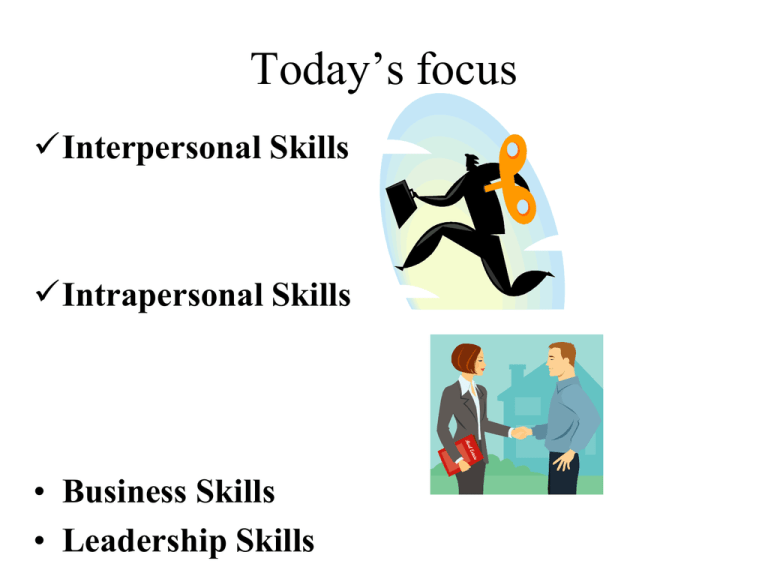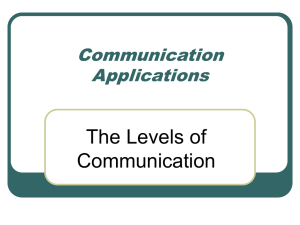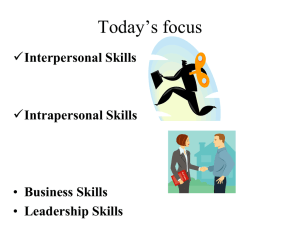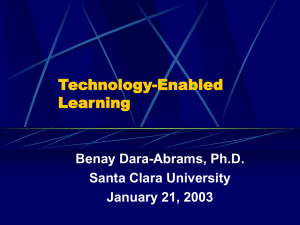Interpersonal & Intrapersonal Skills: Self-Awareness for Leaders
advertisement

Today’s focus Interpersonal Skills Intrapersonal Skills • Business Skills • Leadership Skills To develop interpersonal & intrapersonal skill you have to become… SELF AWARE • • • • • How is it taught? Why become self aware? What is self awareness What to become aware about? How to make the self awareness process valuable for yourself ? How Self Awareness is taught Reading Self Assessment 1. Hogan & Warrenfeltz 1.Own assessment of (2003). Educating the inter- and intrapersonal Modern Manager skills 2. Descriptions of Big- 2. Someone else’s 5 Personality assessment of your inter Dimensions and intrapersonal skills 3. “Learning from Inventories” 3. Big Five Personality Dimensions Discussion Concepts Why become self aware? • To develop intrapersonal skills • To develop interpersonal skills • To improve performance (Church, 97) Human et al 1999, Janasz et al Why become self aware? • To develop intrapersonal skills…. – To choose appropriate careers, • What are the possible careers you have chosen for yourself? • What factors did you consider when choosing these careers? – Your personality? Your interests? Fit between personality and environment of these careers? » Note: personality predicts career success & satisfaction – To manage yourself by setting appropriate goals, manage stress (especially of the environment of the career you have chosen) – To accept your tendencies of behaving, thinking & feeling because 30% of personality is genetic Human et al 1999, Janasz et al Why become self aware? • To develop interpersonal skills – Understand differences between you and others – Understand why others react to you the way they do – Adapt your communication behaviors to others’ reactions • To improve performance (Church, 97) Human et al 1999, Janasz et al What is self awareness • Ability to assess one’s personality, behaviors & skills accurately by Assign 1 – Observing one’s own thoughts, behaviors, skills, using reliable, valid, & structured questionnaires • How do you know these questionnaires are valid & reliable? – Comparing own observations to an external source – a known other in a professional context & intimate context – a complete stranger in this class context (professional) • Validity of these perspectives in a LEADERSHIP context – Incorporating comparison into self observation & subsequent behavior- Assign 2 Bass & Avolio, 90; Learning from Inventories, Marcic et al, 310, Wicklund, cited in Atwater & Yammarino, 1992 What should leaders become self-aware about? Intrapersonal Skills Interpersonal Skills Self Monitoring Attitudes toward Self Control authority Social Skills Self Esteem Do you already have this awareness? • In the pre-requisites to this course (B23/B27) you became self aware of your Personality • But … you did not compare with another’s perspective of you and • They were not specific to leadership skills Review: What is Personality • A person’s tendency toward thinking, behaving and feeling in consistent ways across different types of situations & across time Review of B23 Examples of Personality • Extraversion – Gregariousness (talkativeness), friendliness, assertiveness, activity level, excitement seeking, cheerfulness • Agreeableness – Sympathy, Trust, Morality, Altruism, Cooperation, Modesty Review of B23 How is behavior different from Personality? • Behavior – Can be observed/measured all the time • E.g., Talkativeness in social situations is extraversion vs. talkativeness in non social situations is not – Is influenced by personality & other factors • E.g., Talking in class is determined by personality and reinforcement in class whereas talking across different social situations is determined by personality Personality vs. Skill Skill Changeable/malleable Personality Relatively more stable across time and situation Relatively genetic More abstract (higher level) Learned More concrete (lower level) e.g., Interpersonal Skill e.g., Extraversion – Part of Extraversion e.g., Agreeableness + part of e.g., Conscientiousness Agreeableness + Conscientiousness Personality vs. interpersonal skills? Interpersonal Skills Conscientiousness Self Control Extraversion Self Monitoring Social Skills Agreeableness So how does personality map onto intra and interpersonal skills? Intrapersonal Skills Interpersonal Skills Conscientiousness Attitudes toward Self Esteemauthority Emotional Stability Self Control Extraversion Self Monitoring Social Skills Agreeableness Agreeableness Back to… What should leaders become self-aware about? Intrapersonal Skills Interpersonal Skills Self Monitoring Attitudes toward Self Control authority Social Skills Self Esteem Social Skills: A facet of Agreeableness & Extraversion Interpersonal Skills Extraversion Intrapersonal Skills Social Skills Agreeableness Definition of Social Skills • • • • Able to read others accurately Make favorable first impressions Adapt to a wide range of social situations Be persuasive Baron & Markman 2000 But…Social Skills are only part of Interpersonal Skills Social Skills Self Control Self Monitoring Intrapersonal Skills Interpersonal Skills Interpersonal Skills Initiate, build, maintain • Social Skills – Put oneself in the place of another person and try to understand what the person expects in an interaction • Self-monitoring – Incorporate information about other person’s expectations in one’s subsequent behaviour e.g., Regulating oneself when interacting with supervisor • Self Control – Stay focused on the other person’s expectation • E.g., supervisor’s expectation of being treated with respect What is self-monitoring? • Self monitoring – Extent to which you monitor, regulate, control yourself in social situations • E.g., a high self monitor may deceive people by being friendly when s/he really dislikes them • Low self monitors behave according to their own inner states whereas high monitors behave according to the social situation Self Control: A Facet of Conscientiousness Conscientiousness Intrapersonal Skills Interpersonal Skills Self Control Validity: Related to career outcomes What is Self Control? • Features… – Impulse control : Delay gratification – Persistence • On task; • on others’ expectations – E.g., customer service context – Low risk seeking (for self and other) – Low self centeredness – Ability to Control emotions • E.g., Temper, anxiety • In social (interpersonal) and personal (intrapersonal) context What’s next.. Why become self aware What is self awareness What to become aware about? • How to make the self awareness process valid (i.e., useful) for yourself ? How to make the self awareness process valid Sample Question for Final • Why measure interpersonal/ intra personal skills? • Why should you trust the scores on the inventories you completed in this course? • Why should you obtain some else’s assessment of your interpersonal & intrapersonal skills? • Why may there be such discrepancies between your own vs. another’s view of your inter and intra personal skills • How will you go about narrowing such discrepancies? Sample Question for Final • Describe a concrete behavioral example that illustrates the difference and similarity between – – – – self-control and self monitoring Social and inter-personal skills inter-personal and intra-personal skills self-control different in the intra-personal vs. inter-personal context What you learned today--I • Why become self aware – To improve performance, manage career, improve interpersonal interactions • What is self awareness – Knowing about yourself via feedback from self/peers/others and changing yourself appropriately What you learned today--II • What to become aware about? – Personality, interpersonal & intrapersonal skills • How to make the process of self awareness valuable for you? – Take valid surveys, compare your perception to another’s perception








